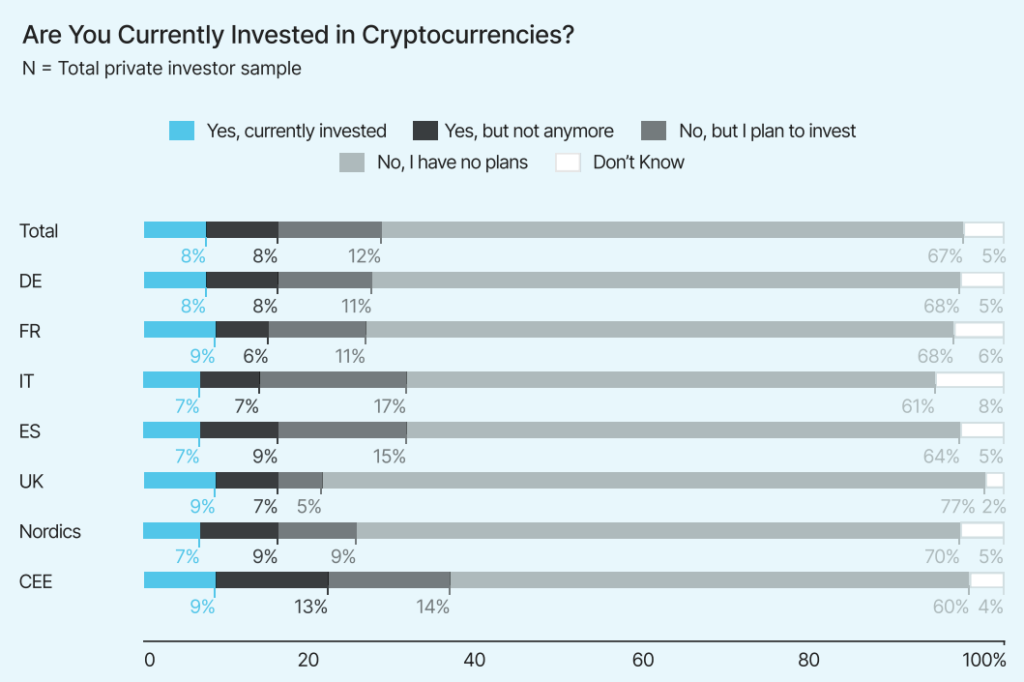A recent survey has shed light on the significant gap between European banks’ adoption of cryptocurrencies and the increasing interest among investors in the region. As digital assets gain momentum across Europe, traditional financial institutions seem to be ill-prepared to meet the rising demand, potentially jeopardizing their competitiveness in an ever-evolving market.
Underestimating the Crypto Surge
The Bitpanda survey conducted by a leading crypto investment platform indicates that a majority of EU banks are underestimating the demand for crypto-related services. Despite the surging popularity of cryptocurrencies like Bitcoin and Ethereum, only a small fraction of banks currently offer services such as custody, trading, or investment options for these assets. This reluctance stands in stark contrast to the growing appetite among retail and institutional investors in Europe who are actively seeking exposure to digital currencies.
Europe leads the global market with 63 banks offering crypto services, including trading, custody, staking, and payments. However, this number represents only a tiny portion of the overall banking sector, suggesting a broader resistance to adapt to the changing landscape.
The Bitpanda report highlights regulatory uncertainty and risk aversion as key factors holding banks back from embracing cryptocurrencies. Many institutions remain cautious due to years of mixed signals from EU regulators, despite the emergence of frameworks like the Markets in Crypto-Assets Regulation (MiCA) that aim to provide clarity.
A Growing Divide Between Innovators and the Status Quo
While some financial institutions are taking proactive steps to incorporate crypto services, the overall adoption among European banks remains limited. For instance, Deutsche Boerse’s Clearstream is set to introduce cryptocurrency custody and settlement services for institutional clients, focusing on Bitcoin and Ether. Similarly, BBVA has obtained approval to offer Bitcoin and Ether trading services in Spain through its mobile app.
However, this cautious approach could lead to missed opportunities for European banks, especially considering that many investors prefer to engage with cryptocurrencies through traditional banking channels. As the regulatory environment evolves and investor interest continues to grow, banks in Europe may need to reassess their strategies to stay competitive in the rapidly evolving financial landscape.
Signs of Momentum Among European Banks
Despite the overall caution among European banks, some are beginning to adapt to the changing landscape as investor demand and regulatory clarity improve. Institutions like BBVA, Clearstream, and DekaBank are among those leading the way in offering crypto services to their clients. DekaBank recently partnered with digital asset platform Metaco to launch a blockchain-based tokenization platform for institutional clients seeking secure and compliant exposure to cryptocurrencies.
Moreover, regional banks in Europe are quietly exploring pilot programs around tokenization and blockchain-backed financial products, indicating a broader integration of cryptocurrencies beyond major institutions. These early developments suggest a shift in the traditional banking sector and highlight the potential for banks that have taken early steps to gain a competitive edge in the future financial services market.
In conclusion, as new regulations like MiCA come into effect across the EU, banks that have embraced cryptocurrencies early on may find themselves better positioned to thrive in the next phase of financial services. It is crucial for European banks to adapt to the changing landscape and meet the growing demand for crypto-related services to remain relevant in the competitive market.

